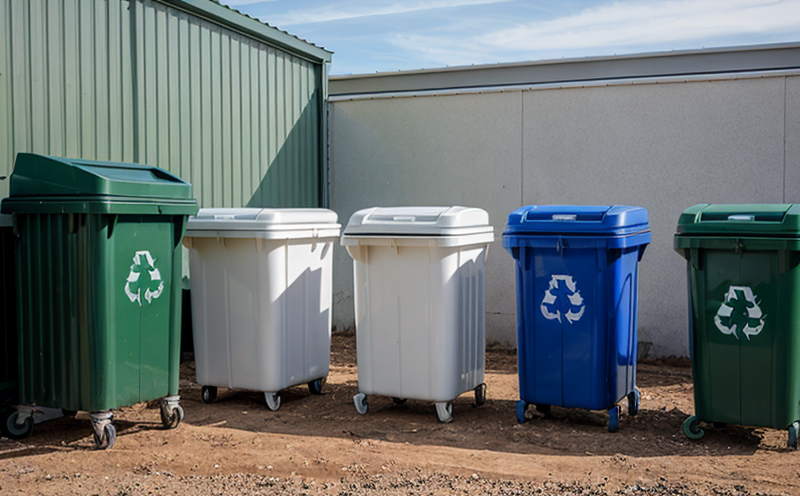ISO 14064 Carbon Footprint Assessment
The ISO 14064 series of standards provides a framework for quantifying and reporting greenhouse gas (GHG) emissions and removals. Within the context of Packaging Testing, specifically in the sector of Sustainability & Recycling Testing, this service is critical for assessing the environmental impact of packaging materials throughout their life cycle. This assessment helps companies comply with regulations, reduce carbon footprints, and enhance their sustainability credentials.
The ISO 14064 standards are widely recognized in industries that prioritize environmental responsibility. By using these standards, businesses can ensure they are accurately measuring the GHG emissions associated with their packaging processes, products, or services. This not only helps in meeting regulatory requirements but also contributes to reducing overall environmental impact.
At our laboratory, we provide comprehensive ISO 14064 carbon footprint assessments tailored specifically for packaging materials. Our team of experts will guide you through the entire process, from initial consultation and specification development to final report generation. We use state-of-the-art tools and methodologies to ensure that all data is collected accurately and reported transparently.
The first step in any carbon footprint assessment using ISO 14064 involves defining the scope of the project. This includes identifying which activities, processes, or products are included in the calculation. For packaging materials, this could encompass raw material extraction through to end-of-life disposal options. Once defined, we move on to data collection and validation.
Data collection is a crucial part of the assessment process. It involves gathering information about energy consumption, transportation emissions, waste generation, and other relevant factors associated with each stage of the packaging lifecycle. Our experienced technicians will guide you through this step-by-step, ensuring that all necessary data points are captured accurately.
After collecting the required data, our team validates it to ensure accuracy and completeness. This ensures that any subsequent calculations based on this information are reliable and trustworthy. Validation might involve comparing collected data against industry benchmarks or historical records where available.
The final step in an ISO 14064 carbon footprint assessment is reporting. Our reports provide a detailed breakdown of emissions by category, along with recommendations for reducing them effectively. These insights can be invaluable for companies looking to improve their sustainability practices and contribute positively towards global climate goals.
By partnering with us on your ISO 14064 carbon footprint assessments, you gain access to expert knowledge and cutting-edge technology designed specifically for this purpose. Whether it’s for regulatory compliance or internal reporting needs, we have the capability to meet all your requirements efficiently and effectively.
Why It Matters
The importance of reducing carbon footprints cannot be overstated in today's world where climate change is one of the most pressing issues facing humanity. For packaging manufacturers, suppliers, and consumers alike, understanding their environmental impact is essential for making informed decisions that align with sustainability goals.
- Regulatory compliance: Many countries are implementing stricter regulations regarding GHG emissions from various sectors including manufacturing. Compliance can save companies significant fines and reputational damage.
- Social responsibility: Consumers increasingly demand products that are environmentally friendly. Demonstrating a commitment to reducing carbon footprints through credible assessments like ISO 14064 helps build trust with stakeholders.
- Competitive advantage: Companies that lead in sustainability often enjoy advantages over competitors who lag behind. This includes better brand perception and potentially higher sales volumes due to customer loyalty.
In summary, conducting an ISO 14064 carbon footprint assessment offers numerous benefits beyond just meeting legal obligations. It enables organizations to identify areas for improvement within their operations, communicate effectively with stakeholders about environmental performance, and ultimately contribute positively towards mitigating climate change impacts.
Scope and Methodology
The scope of an ISO 14064 carbon footprint assessment tailored to packaging materials encompasses several key aspects. Firstly, it involves defining the boundaries within which emissions are calculated—this could range from a single production facility up to an entire supply chain depending on specific requirements.
Data collection methods vary but typically include reviewing internal records such as utility bills, transportation logs, and waste management reports. External data sources may also be utilized if relevant information is not readily available internally. All gathered data must then undergo rigorous validation checks to ensure its accuracy before proceeding further into the assessment process.
Methodologically speaking, ISO 14064 provides guidelines on how to calculate emissions factors for different sectors and activities. For packaging materials, this might include specific coefficients related to material extraction, processing, transportation, use phase, and disposal options. These calculations take into account direct vs indirect emissions as well as absolute vs relative baselines.
Once all necessary data has been collected and validated according to ISO 14064 standards, the next stage is quantifying the total carbon footprint of the packaging under consideration. This involves summing up all identified emissions across defined categories while considering any offsets or reductions achieved during production processes.
Industry Applications
- Packaging manufacturers seeking to reduce their environmental impact.
- Suppliers looking for ways to improve the sustainability credentials of their products.
- Brands aiming to enhance their corporate social responsibility (CSR) initiatives by incorporating accurate carbon footprint data into marketing materials.
- R&D teams exploring new materials and technologies that offer lower carbon footprints compared to traditional options.
In addition to these applications, ISO 14064 carbon footprint assessments can also be beneficial for procurement departments when evaluating suppliers. By understanding the environmental performance of potential partners, companies can make more informed decisions about which entities align best with their sustainability objectives.





